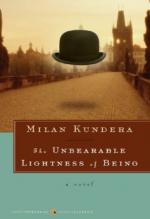|
This section contains 774 words (approx. 3 pages at 300 words per page) |

|
From the beginning of Milan Kundera's writing career—and even in his early short stories—he has been addressing the problem of how, in [Virginia] Woolf's formulation, the 'granite' of ideas can sit comfortably beside the 'rainbow' of poetic truth, and in ['The Unbearable Lightness of Being'] he has triumphed, though at some cost; a metaphysical inquiry into the nature of fate and two love stories, related with Kundera's usual blend of scepticism and compassion, are united in a lucid novel whose exhilarating pessimism is subtly, and perhaps confusedly, challenged by the warmth of the telling.
It is partly the very nature of Kundera's ideas that prevents them from smothering the vitality of this novel, and partly the way he presents his characters. His agnosticism and nihilism allow him a freedom, an absence of commitment, which her passionate feminism denied Virginia Woolf in 'The Pargiters.' The lightness...
|
This section contains 774 words (approx. 3 pages at 300 words per page) |

|


